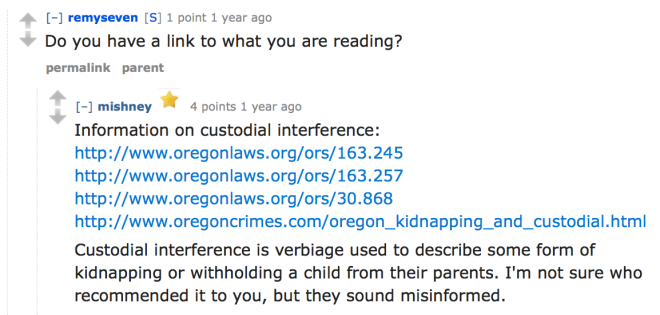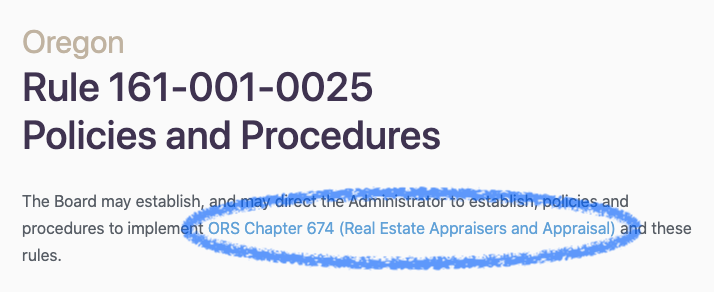No Analytics. No Surveillance. Just Law. 7 Apr 3:44 PM (11 days ago)
🔒 No Analytics. No Surveillance. Just Law.
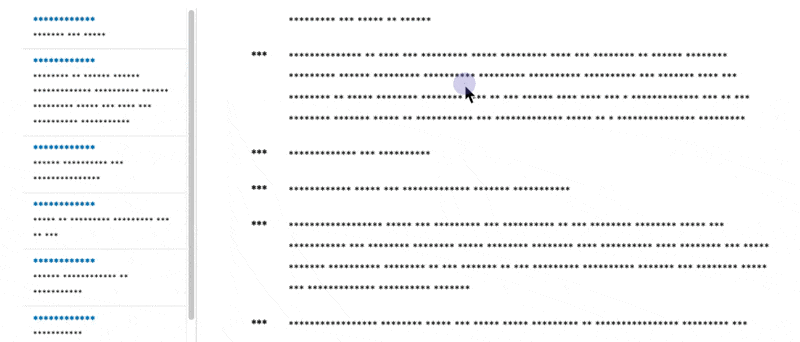
Most legal websites rely heavily on free tracking tools from Google, Meta (Facebook), and others, turning your private legal searches into marketing data. Public.Law is different:
- Google Analytics is removed.
- No Meta (Facebook) tracking.
- No third-party scripts silently monitoring your activity.
Instead, we rely entirely on simple server-side logs for usage insights, combined with anonymized error monitoring for site stability.
When Something Breaks, Here’s What We See (and Nothing More)
We use Sentry to detect and fix errors quickly, without invasive user tracking.
Here’s an example of a "rage click"—a user repeatedly clicking on an unresponsive area:
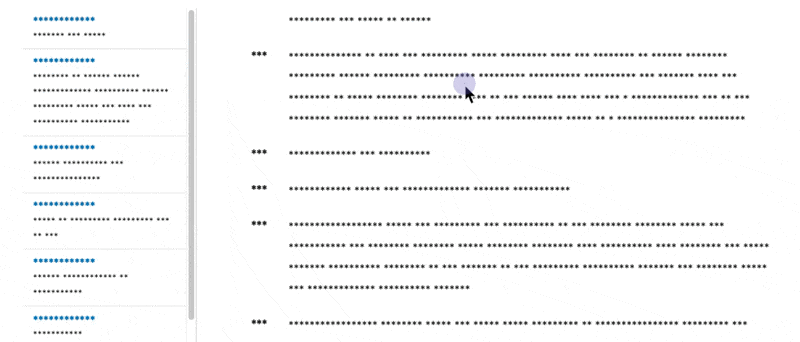
🚫 Blocking Meta Tracking by Design
We actively prevent third-party trackers, including Meta (Facebook), from loading through a Content Security Policy (CSP)—a built-in firewall feature of your browser.
Here's a real CSP log entry showing how we blocked a Facebook tracking script:
Blocked URI: https://connect.facebook.net/en_US/pcm.js
Violated Directive: script-src-elem
Referrer: http://m.facebook.comInstead of allowing Meta to quietly track you, our CSP immediately rejects the script.
Ads and Privacy-Friendly Upgrades
Ads currently support our site, and these ads can send data to ad networks like Google AdSense. However, if you choose to support Public.Law with a pay-what-you-want monthly contribution:
- Ads are completely removed.
- Third-party data exfiltration drops to zero.
- Your visit is clean, private, and fast.
Why This Matters
Legal research often covers sensitive topics—criminal issues, family matters, or civil rights. At Public.Law:
- We don’t track who you are.
- We don’t share your browsing habits.
- We don’t trade privacy for profit.
Your privacy matters to us. We think it should matter to every legal website.
170 New York Laws Updated 24 Sep 2023 7:56 PM (last year)
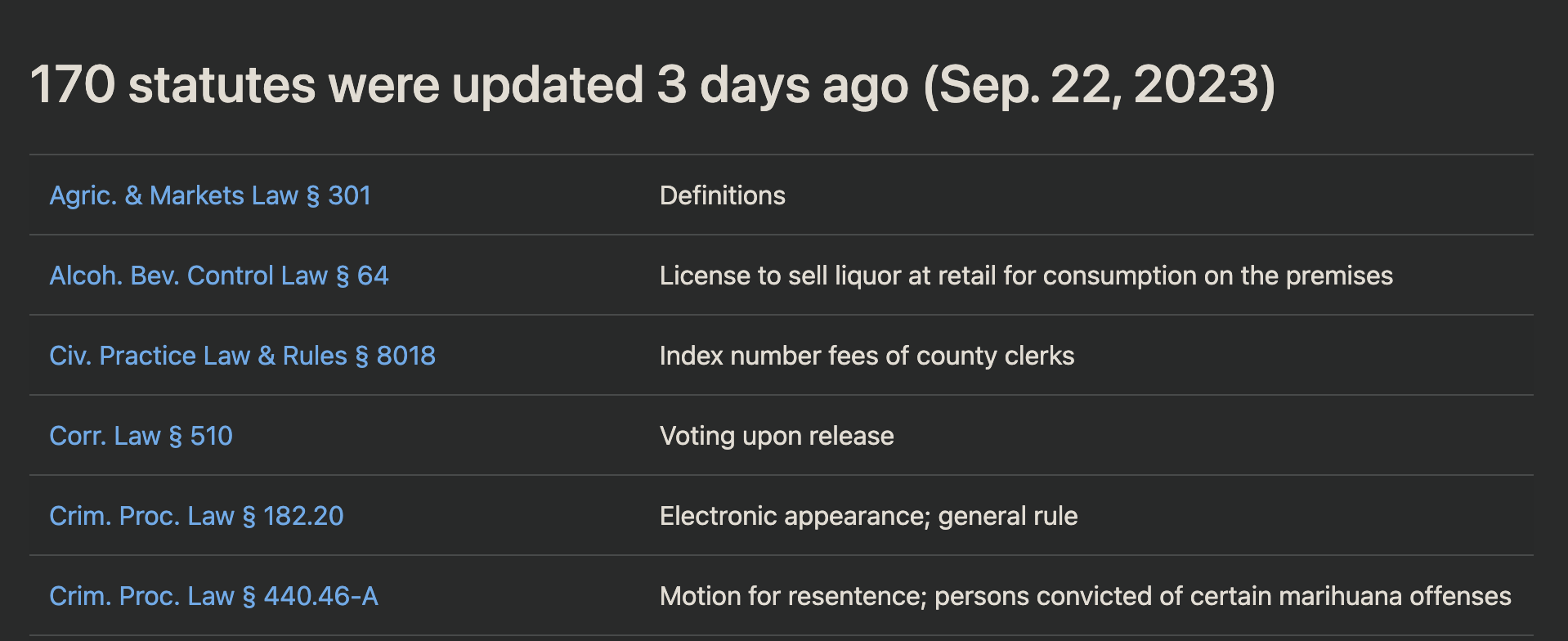
On Friday (Sep. 22, 2023), the NY Senate published changes to 170 Consolidated Laws of New York. We have the full list: newyork.public.law/laws/latest-updates.
Supporting both kinds of NY attorneys: the pragmatic and the pedantic 10 Sep 2023 1:33 PM (last year)

If you're not familiar with internal citations in the Consolidated Laws of NY, you're in for a treat:
"except as provided in section ten hundred of this chapter, shall have remained…"
N.Y. Abandoned Prop. Law § 600 (emphasis mine)
I'm speechless. I'll acknowledge, I'm not a great writer, so that's not saying a whole lot. But this is how the law is usually presented. Fastcase ("Beyond Research"), dutifully reproduces it (paywall):

Fastcase also cites a non-existent "2013 Edition" and shows an outdated version of the text. FindLaw is a little better. They manage to hyperlink half of the citation. But it starts publicly available and then takes you to the Westlaw paywall when you click:

Taking it up a notch
I live for programming challenges like this. Here's how I'm showing hyperlinks on N.Y. Abandoned Property Law § 600:


The Pedantic view simply links to the correct place, leaving the text unchanged. It's good for printing out and handing to a judge.
The Pragmatic view, on the other hand, treats this like an actual web page that real humans need to read. It pulls from the database to embed the title of the link destination. There are also a couple more readability improvements.
I achieved this with a computer science technique called recursive descent parsing. Pretty fun stuff.
Report on jury-tampering allegations in Murdaugh trial: our first original content 10 Sep 2023 11:52 AM (last year)


It's an informal one to start with, and written by me.
The backstory: a new way we're making the law more accessible
I've begun linking to secondary sources that shed light on the law in some way. Here's a great example from the Consolidated Laws of New York. I've placed a very on-point citation to a NYC Loft Board post.
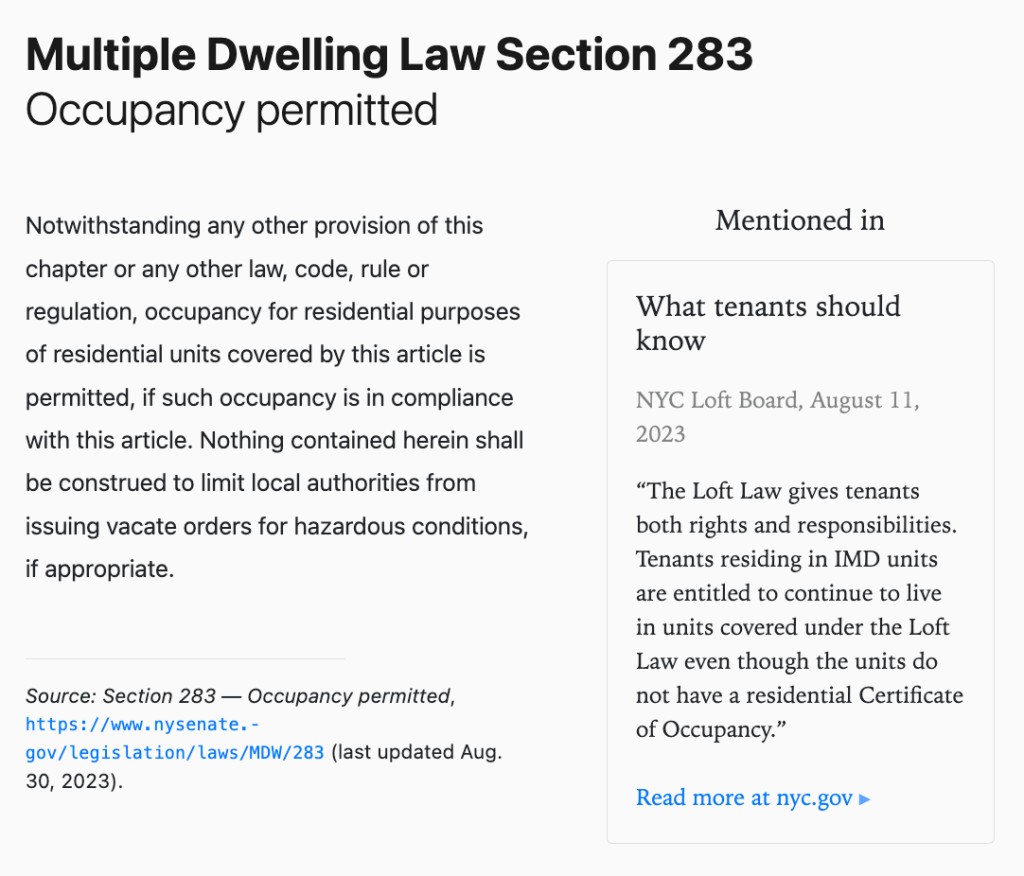
Personally, as an attorney who doesn't specialize in (say) NY "Multiple Dwelling Law", I really appreciate secondary sources like these. Note how the statutory text (the primary source) doesn't actually contain the relevant word, loft. ("Loft" does appear higher up in the hierarchy: this is part of the "Loft Law". So that's on me to elegantly display to website visitors.)
I'm also coding publication indexes, a work in progress:
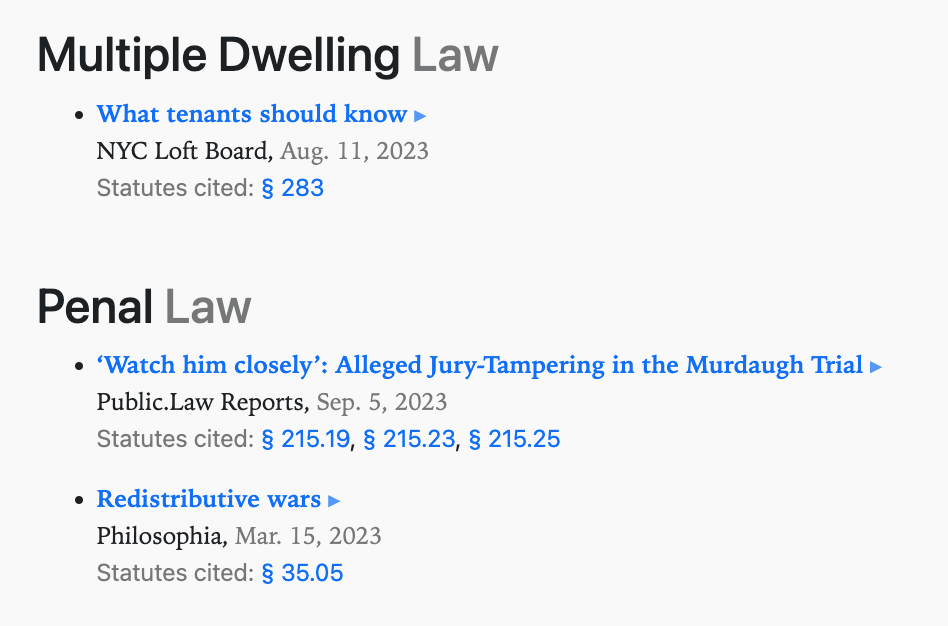
The issue I was faced with is not being able to find topical high quality publications for e.g., current events. And so we've begun publishing our own. Luckily, we have several promising candidates in the pipeline who have much better writing and journalism skills then I.
Oregon Revised Statutes (ORS) — up to date through 2024 6 Aug 2023 3:15 PM (last year)
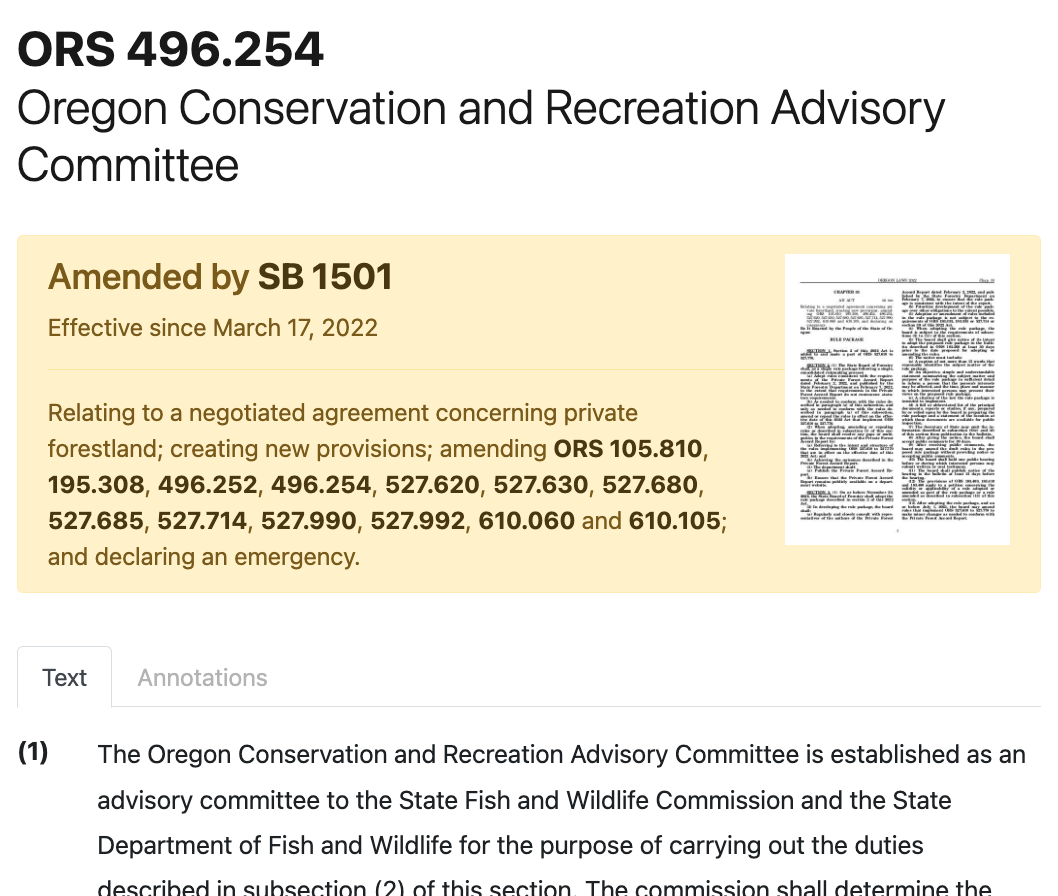
This week I updated the ORS and created the system for keeping it up to date. Here's a little walk-through. You'll see a new note on every page. For example, on the ORS home page:

And in the corner of every other page:
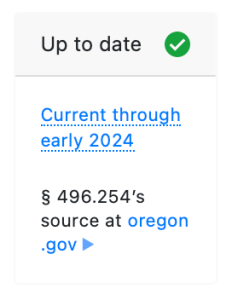
If you click that dotted link, you'll get an explanation of what it means for the ORS to be up to date as I write this in August, 2023. (Hint: the 2023 edition isn't due out until 2024.) The legislature's page has all the details. Click to zoom in:
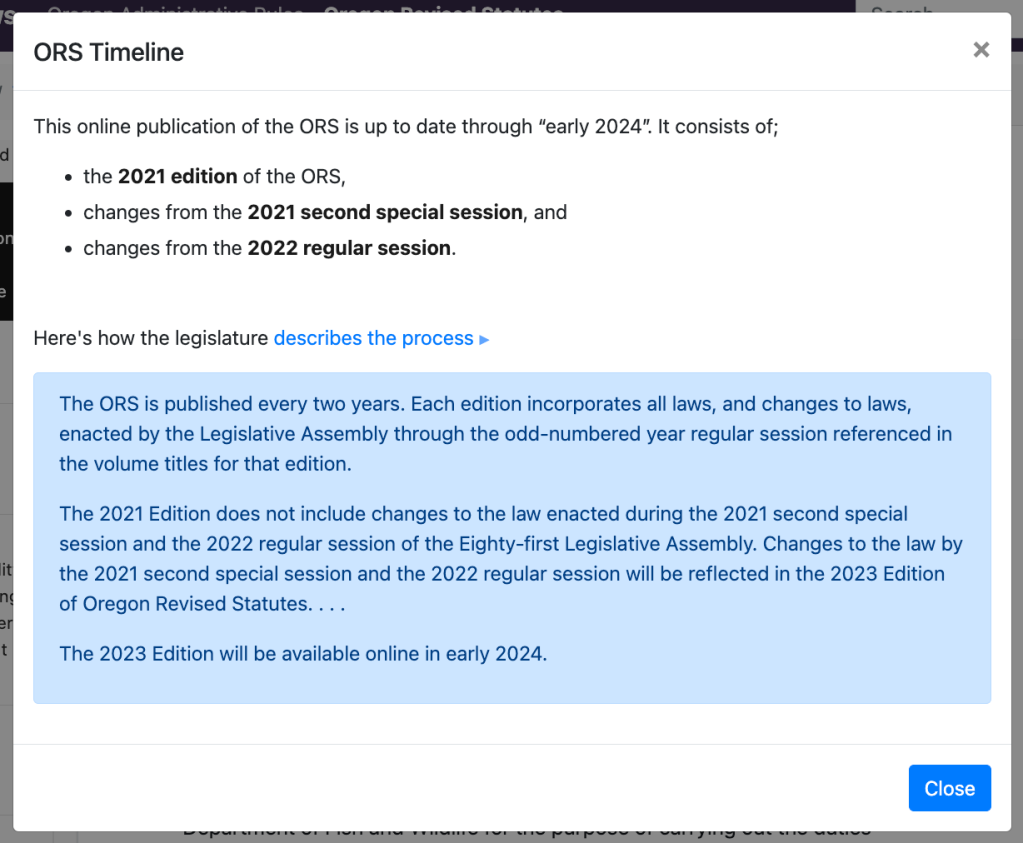
We give links and hints, but you still have to read the PDF.
Now, the state publishes these updates as Session Law PDFs. I've written clever software (source code) that extracts a law's key info. Here's how the site lets you know, "Caution! Check this session law for changes.":
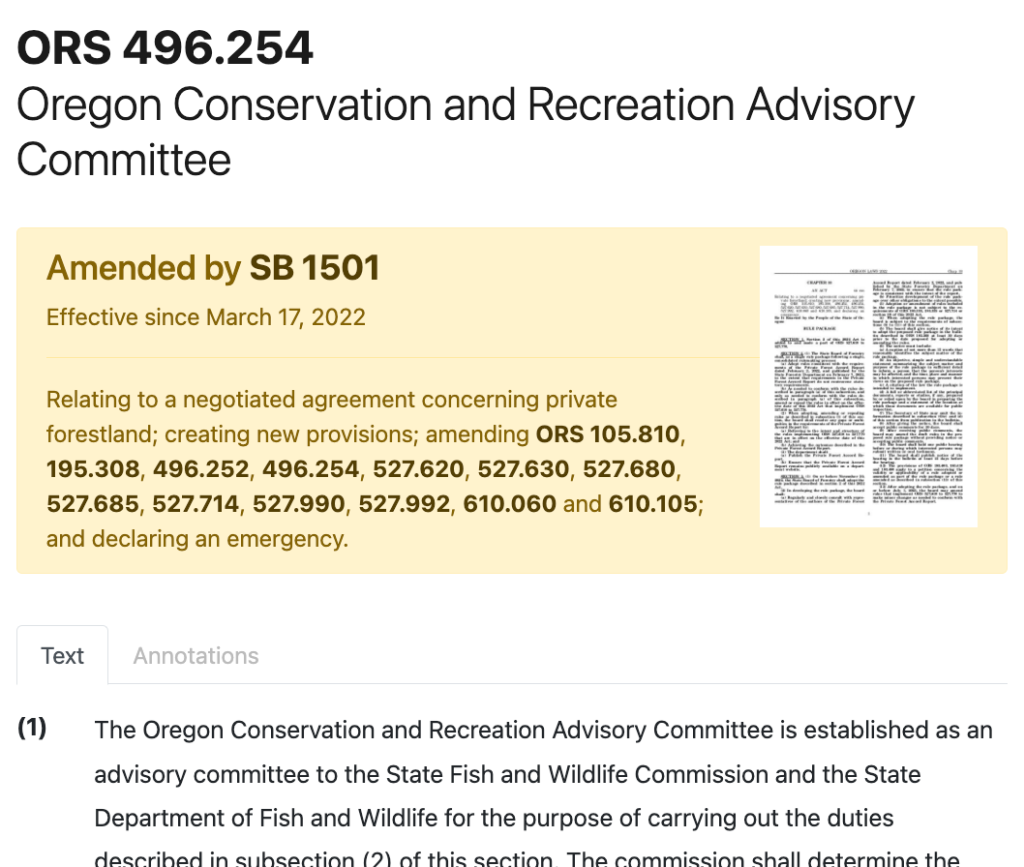
Yes, we still have to read the PDFs. But at least we don't have to dive into the table of changed statutes to find them. 😅 Clicking on the bill's link or the PDF thumbnail pulls up the correct session law:
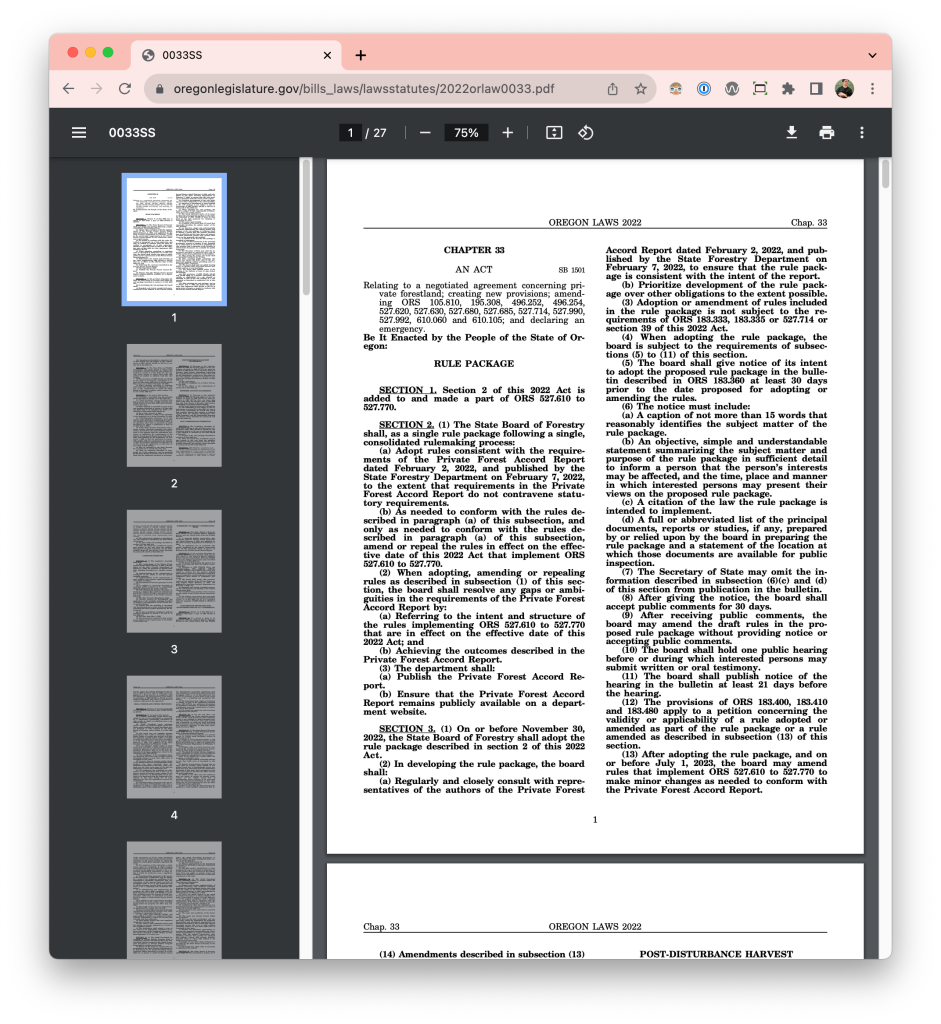
What do you think about this set up? Does it look intuitive and useful? — Robb
New Roadmap; open development of the Oregon 2021 & 2022 updates 29 Jul 2023 2:52 PM (last year)
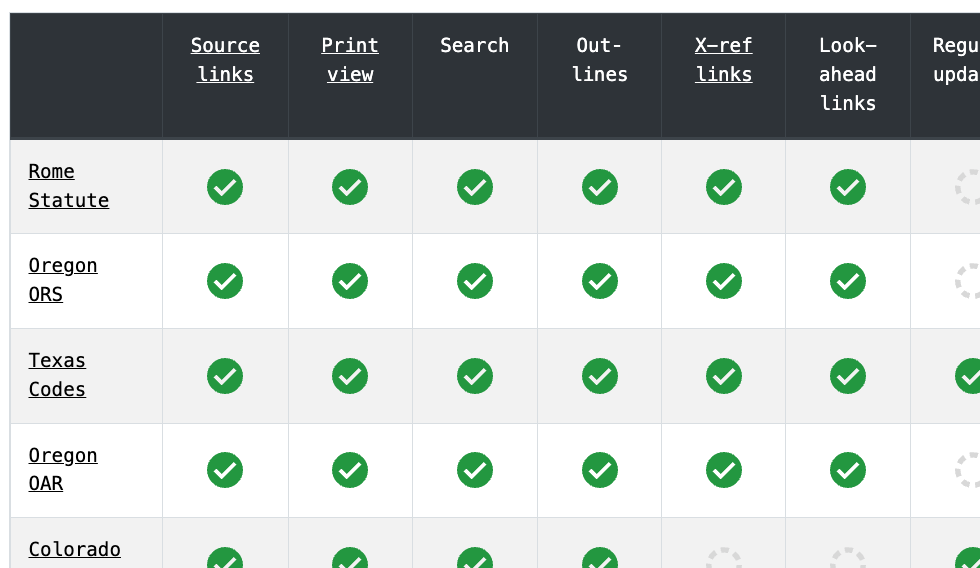
Hi, Everyone. I don't know if it feels like it, but I've been very busy behind the scenes, updating the code. I'm building a foundation.
New integration of amendments to the ORS
This is part of a major re-write of the ORS: highly visible notices for amended and repealed sections:
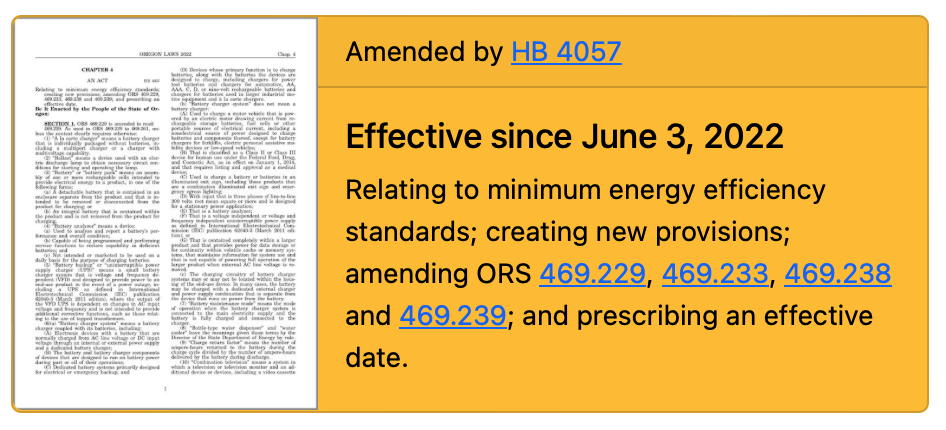
I'm very sorry that these updates to the 2021 ORS aren't published yet. They'll be online within the week. 🙂 As part of this re-write, I've simplified the website process by approx. 5x. You can even follow the development of this feature and see how it works, because I've open-sourced it. (And if you can program in Haskell, you're welcome to contribute.)
Going forward, I've implemented dozens of improvements to the site architecture to speed up development — and keep it running smoothly for another ten years.
More transparency
I created a new development roadmap, linked from the footer of every page:
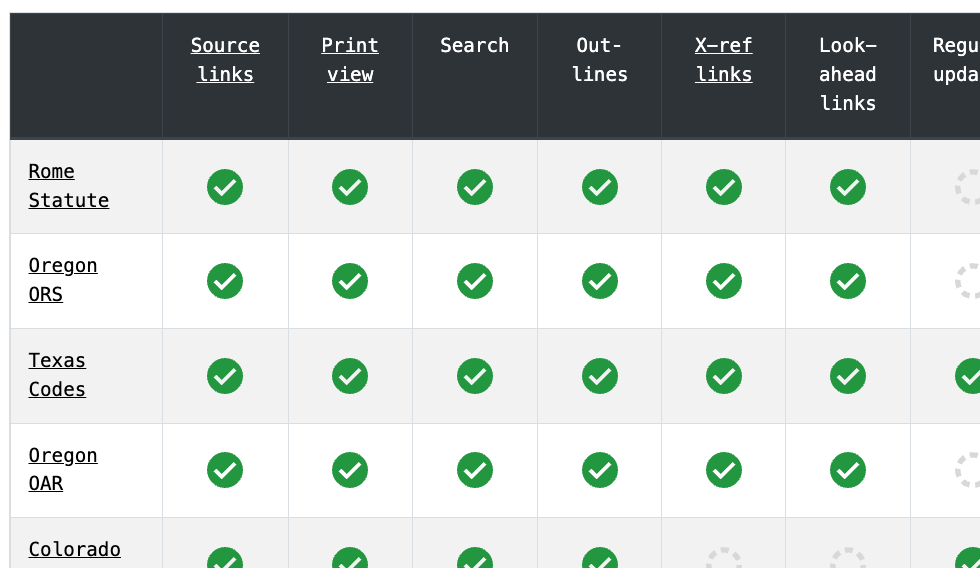
I've set up a live status page at status.public.law, also linked from the page footer:

There, you'll find "uptime" info for all of the Public.Law services. Plus, announcements & updates about outages:
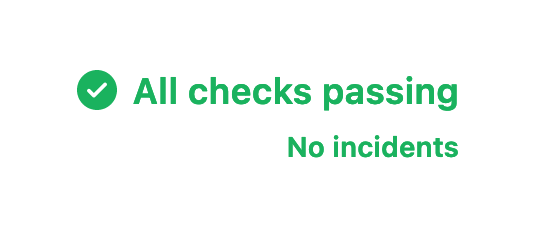
Finally, I publish small updates to Twitter ("X"?) much more frequently than this blog. It's a good place to go to hear about my latest updates.
Thank you for your patience, and your support.
— Robb
Readability improvements to the OAR 17 Jun 2020 8:54 PM (4 years ago)
I've been busy making our Oregon Administrative Rules site easier to read, thanks to plenty of quarantine time.
Links with parentheticals to the ORS
I leveraged our ORS database to enhance the OARs:
To show this info about the ORS, we need to query its database for the statute titles, and then insert them into the OAR pages. We'll be rolling out more of these improvements as we go, building on the data we're collecting.
Improved fraction typography
A small change, but I love these creating little features that improve the reading experience. Here's Rule 603-022-0305, Egg Quality Grade Standards:
Before:

After:

Give us feedback
We ramped up our feedback forum: submit ideas and vote on others.
The 2020 ORS is online 17 May 2020 7:23 PM (4 years ago)
Announcing the only free version of the ORS that's fully current, through the Spring of 2021.

Sharp readers (and pedants) may say, "But there is no such thing as the '2020 ORS'!" And in a sense — the authoritative sense to be sure — that's correct. For these people, we properly cite and link to the 2019 ORS, e.g.:

But we're trying something new: Now that the Oregon legislature has concluded its curiously short session, we've added our customary inline annotation with a link to the bill passed, i.e.,:

The new feature is labelling this collection the ORS for 2020, and making clear that our site is now up-to-date through 2021. We think this will help the 95% of our visitors who simply want to be sure they're reading the current law.
What do you think? Is this an improvement?
Texas Codes, now updated nightly 6 May 2019 1:57 AM (5 years ago)
I'm really happy to announce that I moved the Texas Codes to our always-up-to-date platform. The last refresh times are shown on the main index page,

as well as every statute section page, right below the link to the original source document:
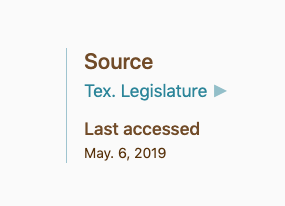
Now the Codes join the Nevada Revised Statutes and Oregon Administrative Rules in always showing content which was refreshed within the past 24 hours.
Please consider pitching in $5 or $10 per month to support public service and enable me to me spend more time on development. This is currently a labor of love which I work on nights and weekends. Thank you!
Oregon Administrative Rules (OAR's): Soft Launch 3 May 2019 8:05 AM (5 years ago)
Here's a sample of the new, always up-to-date, OAR site:
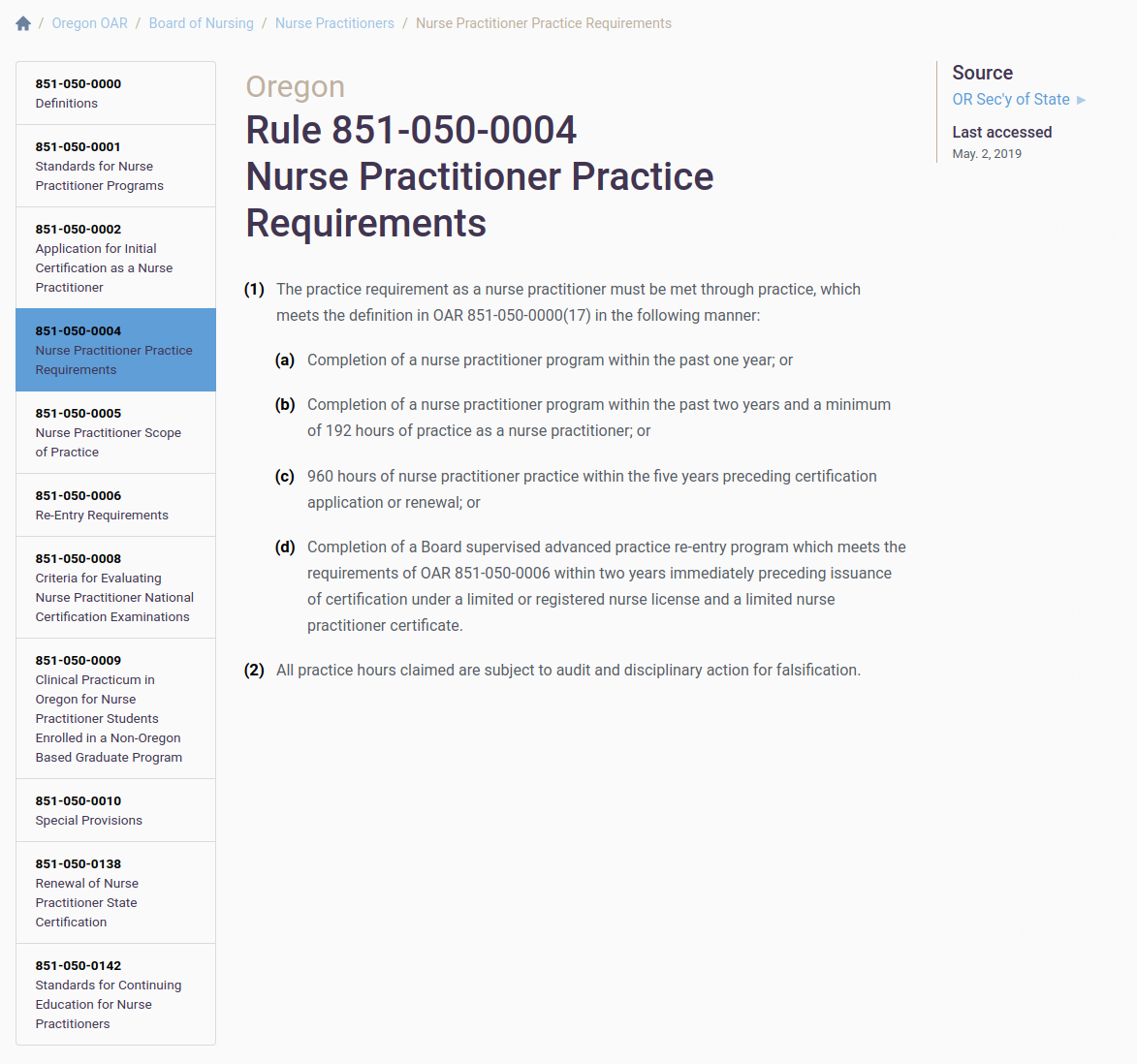
This new public service is the result of many late nights and weekend work. (This is still a part-time labor of love!) I want to get it in front of everyone to help guide the design and make it useful. I'm focussing on what kinds of headings an "navigational sign-posts" should be shown.
What's Finished - Highlights
- Always up-to-date. All content is checked and refreshed nightly. Currency information is displayed with a Last accessed note.
- Re-outlining. The site uses the natural structure of the text to display it visually as an outline.
- Links to every source. Each page links back to the original rule. "Trust but Verify".
- Raw data freely available. A new public service, I've made the nightly parse results available for download. If you have a programmer or data science student in your team, they'll know what to do with a GitHub link.
What's Coming Next
- Links to ORS and other authority / implementing laws.
- Links from relevant ORS sections back to the Rules.
- Display of each Rules' history.
Please consider pitching in $5 or $10 per month to support my work and public service. Thank you!
ORS updated with 2018 amendments 2 May 2019 9:22 AM (5 years ago)
Hi Everyone,
A short note to let you know that after a weekend of work, I've updated the oregonlaws.org ORS to show the 2018 session laws. E.g.:

The next update will come in 2020, when the state publishes the 2019 ORS. In the meantime, I'm moving the ORS to the new nightly update system. This is the new platform which is providing always-current Oregon Administrative Rules (OARs).
Upgraded service for Non-Profit, Educational, and Gov't Users 6 Apr 2018 7:45 AM (7 years ago)
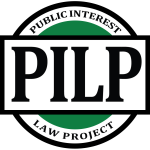
We've expanded our public service: All visitors from these domains now have ad-free browsing and other new features as we roll them out.
.edu .gov .mil .org .us
Some organizations don't follow the usual naming schemes, such as cityofsalem.net and austin.com, and so we've added special configurations for them. But we've likely missed some, so send us an email if you believe you should be upgraded but aren't.
The 2017 ORS is online 6 Apr 2018 7:30 AM (7 years ago)
The current edition of the Oregon Revised Statutes is live on oregonlaws.org, faster and more reliable:
- We significantly reduced the page "weight" in Kilobytes;
- simplified and removed redundant Javascript;
- doubled the server's RAM and CPU power, and
- customized the code to gracefully handle unique content sections.
Work has started on the 2017 Oregon Revised Statutes 26 Mar 2018 12:14 AM (7 years ago)
This is a quick note to inform everyone that I've begun importing the 2017 ORS. I'll be finished this week and will post a follow-up announcement.
The Power of Permalinks 1 Mar 2015 6:27 PM (10 years ago)
Q: What do avid bicyclists and handgun owners have in common?
A: Two things are a need to know the law, and a desire to discuss it.
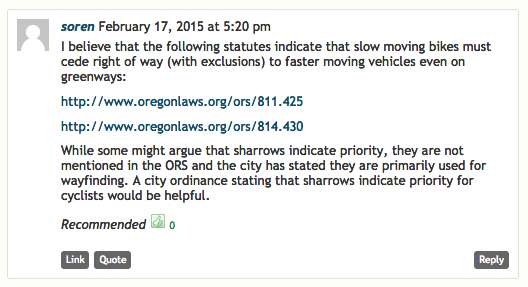
So I conclude that the ability to find, read, and share the law online is a good thing. It might even be the beginning of a more transparent and democratic era. These screenshots show people participating in exactly this way, who were helped out by this website. (Awesome!)
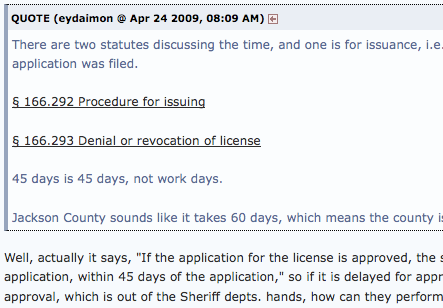
This all might look easy, e.g., "So just make a website, and people can link to it ... what's the big deal?" In reality, though, it's difficult to pull off, and so the status quo is, it doesn't happen.
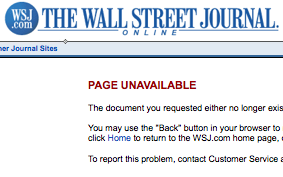
Just look around the web: most pages don't have permalinks ("Persistent URLs", "PURLs") that people can use. And often, even if a web page does have a URL that seems good for linking, there are other show-stoppers: it may not stay working. Or if it does stay working, then it may not contain the same content in a few months' time.

Some great people have taken the story further, writing lighthearted web pages (Tim Berners-Lee), and creating videos (Citability.org).
